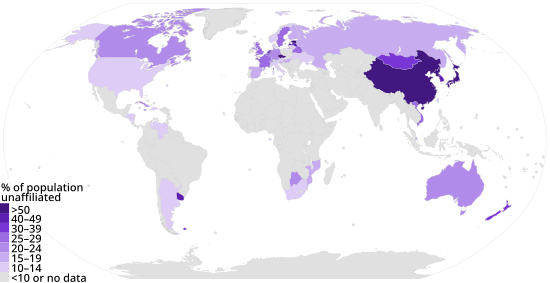
Back اللادينية حسب البلد Arabic Списък на страните по нерелигиозност Bulgarian Irreligión por país Spanish بیدینی بر پایه کشور Persian Irréligion par pays French רשימת מדינות לפי אי-דת HE Országok listája a vallástalanok alapján Hungarian Populasi umat tak beragama menurut negara ID Irreligiosità nel mondo Italian არარელიგიურობა ქვეყნების მიხედვით Georgian

Irreligion, which may include deism, agnosticism, ignosticism, anti-religion, atheism, skepticism, ietsism, spiritual but not religious, freethought, anti-theism, apatheism, non-belief, pandeism, secular humanism, non-religious theism, pantheism, panentheism, and New Age, varies in the countries around the world.
According to reports from the WIN/Gallup International's (WIN/GIA) four global polls: in 2005, 77% were a religious person and 4% were "convinced atheists"; in 2012, 23% were not a religious person and 13% were "convinced atheists";[2] in 2015, 22% were not a religious person and 11% were "convinced atheists";[3] and in 2017, 25% were not a religious person and 9% were "convinced atheists".[4]
In 2010, the religiously unaffiliated number 1.1 billion (about one-in-six people or 16% of the 6.9 billion population at the time), according to Pew Research Center.[5][6][7]: 24 This "include atheists, agnostics and people who do not identify with any particular religion in surveys"; of that overall category, many may still hold some religious beliefs and some engage in religious practices as well.[6]
In 2006, according to sociologist Phil Zuckerman, broad estimates of those who have an absence of belief in a god range from 500 to 750 million people worldwide.[8] According to sociologists Ariela Keysar and Juhem Navarro-Rivera's 2013 review of numerous global studies on atheism, there are 450 to 500 million positive atheists and agnostics worldwide (7% of the world's population) with China alone accounting for 200 million of that demographic.[9][citation needed] In 2004, relative to its own populations, Zuckerman ranks the top 5 countries with the highest possible ranges of agnostics and atheists: Sweden (46–85%), Vietnam (81%), Denmark (43–80%), Norway (31–72%), and Japan (64–65%).[10][11]
A 2023 Gallup International survey found that Sweden was the country with the highest percentage of citizens that stated they do not believe in a god.[12]
- ^ "Religious Composition by Country, 2010-2050". Pew-Templeton Global Religious Futures project. Pew Research Center. 2 April 2015. Retrieved 4 November 2024.
- ^ "Global Index of Religion and Atheism" (PDF). WIN/Gallup International. Archived from the original (PDF) on 16 October 2012. Retrieved 13 January 2015.
- ^ "Losing our Religion? Two-Thirds of People Still Claim to be Religious" (PDF). WIN/Gallup International. 13 April 2015.
- ^ "Religion prevails in the world" (PDF). Gallup International. 14 November 2017. Archived from the original (PDF) on 14 November 2017. Retrieved 27 February 2018.
- ^ "The Global Religious Landscape". The Global Religious Landscape: A Report on the Size and Distribution of the World’s Major Religious Groups as of 2010. Pew Research Center’s Forum on Religion & Public Life. 18 December 2012. Archived from the original on 26 December 2018. Retrieved 4 November 2024.
- ^ a b "Religiously Unaffiliated". The Global Religious Landscape: A Report on the Size and Distribution of the World’s Major Religious Groups as of 2010. Pew Research Center’s Forum on Religion & Public Life. 18 December 2012. Archived from the original on 9 July 2024. Retrieved 4 November 2024.
- ^ Hackett, Conrad; Grim, Brian J. (December 2012). "Religiously Unaffiliated" (PDF). The Global Religious Landscape:A Report on the Size and Distribution of the World’s Major Religious Groups as of 2010. Pew Research Center’s Forum on Religion & Public Life. p. 82. Retrieved 4 November 2024.
- ^ Cite error: The named reference
Zuckermanwas invoked but never defined (see the help page). - ^ Keysar, Ariela; Navarro-Rivera, Juhem (1 October 2013). "36. A World of Atheism: Global Demographics". In Bullivant, Stephen; Ruse, Michael (eds.). The Oxford Handbook of Atheism. Oxford University Press. pp. 553–586. ISBN 978-0199644650. Retrieved 4 November 2024.
- ^ "The Cambridge Companion to Atheism - PDF Drive".
- ^ "81-F77-Aeb-A404-447-C-8-B95-Dd57-Adc11-E98".
- ^ Whether or not you belong to a religion, do you believe or not believe in the following? - God (Image).